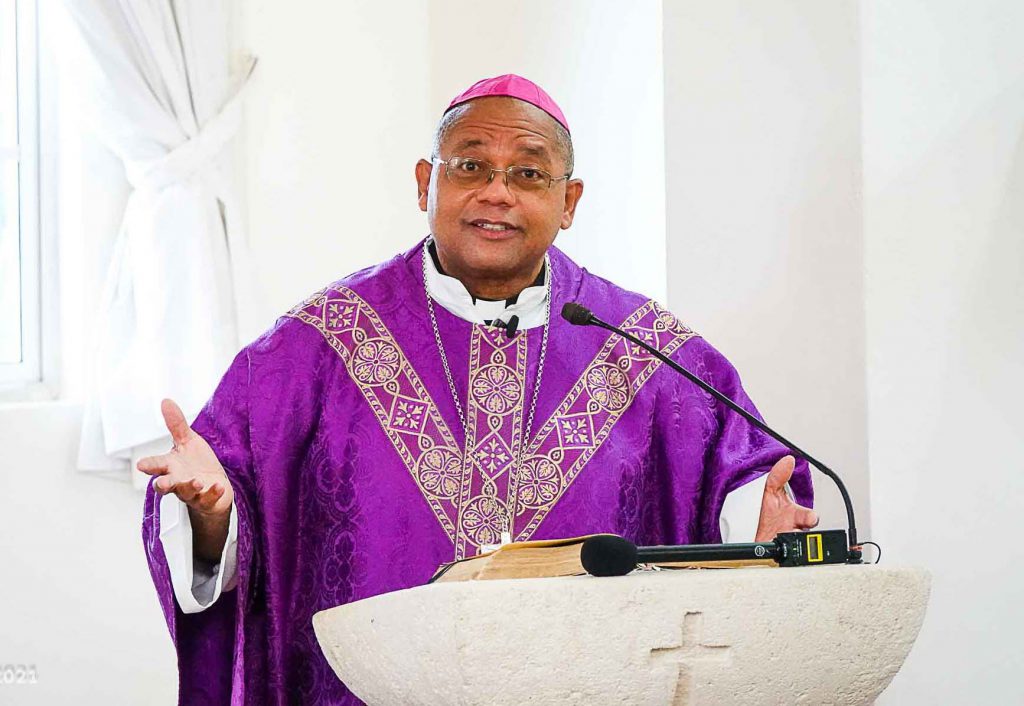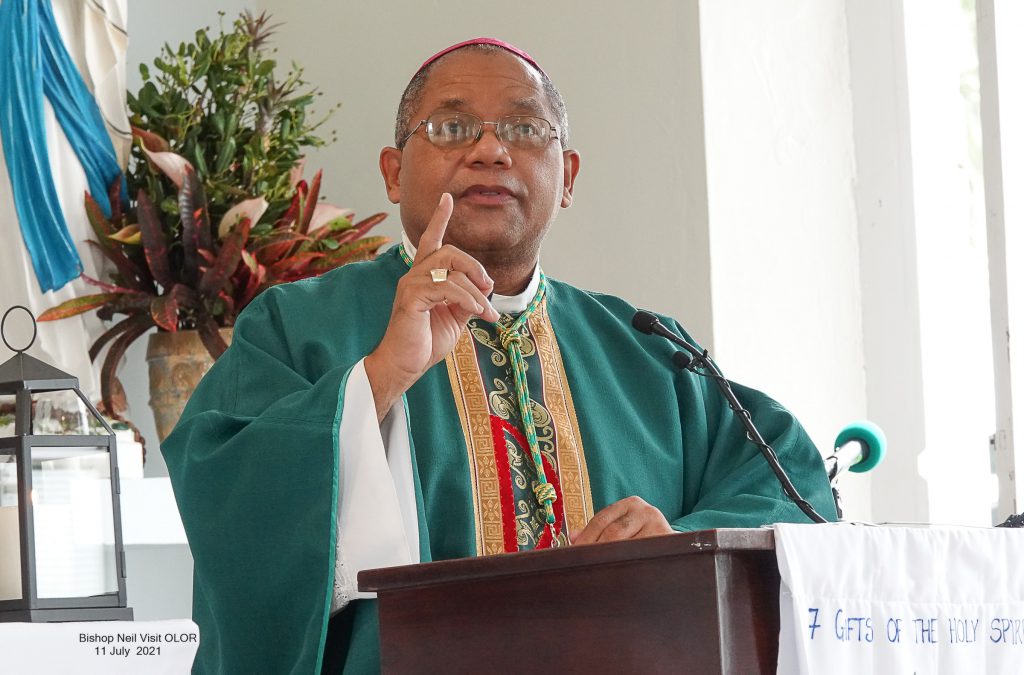Yello Interviews: Roman Catholic Bishop of Bridgetown Neil Scantlebury (Part One)
by Karen Rollins Jan 3, 2022

In June 2021, Father Neil Scantlebury became the first-ever Barbadian-born bishop in the Roman Catholic Church when he was ordained Bishop of Bridgetown.
Bishop Neil grew
up in a close-knit family in Speightstown, St Peter and along with his father and
mother (Keith and Myrna) and two older brothers, was heavily involved in life
at Our Lady of Sorrows Catholic Church in Ashton Hall.
When Bishop
Neil was studying Mechanical Engineering at the University of the West Indies
in Trinidad, he started to feel that God was calling him to the priesthood.
A brief
visit to the US Virgin Islands (USVI) set him on the path to becoming a parish
priest, and after studying at a seminary in America, he graduated in 1995 and returned
to the USVI to serve in various churches.
In December 2020, Pope Francis asked Father Neil to become the next Roman Catholic Bishop of Bridgetown, and he accepted.Yello chatted with Bishop Neil about his new role and what he hopes to achieve.
Please
tell us a bit about your childhood.
I grew up in
Speightstown, St Peter. My parents were Keith and Myrna, and I have two older
brothers, Michael and Joel. My mother worked at St Joseph Hospital, when it was
there in Ashton Hall, and my dad was at Plantations Ltd.
I went to
Speightstown Boys Primary School and Combermere School. I enjoyed playing
cricket and riding bicycles.
How involved
were you in church as a child?
My brothers
and I were raised Catholics, so my life hovered around Our Lady of Sorrows
Catholic Church.
Church was
what we did as a family every Sunday and when there were different things to be
done at the church they would always call the Scantlebury family. My father and
his sons would all go, and we did whatever was needed really, whether that was
cleaning, fixing, repairs, or stamping the collection envelopes. For me, it was
a blessing to help.
We were also
all altar servers, and I remember as a child wanting to follow my dad (who was
a Deacon) into the sanctuary and to be up there with him. So, since I was a
little boy I was serving at Mass, and I enjoyed it, so maybe that started the
ball rolling for who I am today.
I enjoyed
church and serving, and I never really stopped serving throughout my life. Even
when I went to Trinidad to study engineering, I still helped at Mass and
whenever and however possible, especially during Easter and Christmas.
What were
your initial career plans after school?
I left
Combermere School and went to Trinidad to study Mechanical Engineering.
Basically,
the plan was to study, come out and get a big job as an engineer, have a wife
and 12 children, and live happily ever after. The whole Cinderella-type thing.
But God had other plans for me.
Before going
to university in Trinidad, my parish priest told me to introduce myself at the
chaplaincy and offer my services.
So, here I was thinking that I could maybe open my wings and do what I wanted like all students, but no, they put me to work right away.

How did
your faith develop while you were at UWI?
I got
involved with the UWI Prayer Group and was part of the leadership. Then, in my
second year at UWI, I lived in the Men’s Household, and that helped to foster
further my devotion to the Eucharist, prayer, and reading the scripture.
In my final
year, I started to discern that engineering wasn’t going to be it for me. I
ended a relationship and decided to spend some time focused on what God was
calling me to do. I sensed that God was calling me to the priesthood.
So, you
decided to be a priest while in Trinidad?
Well, the
thing about it was that, when I was five, I first thought about becoming a
priest, so it wasn’t a new calling. We had a priest in our parish who was
active and fun, and growing up he would take us on various outings, so I remember
that I wanted to be like him. When I was 23, the calling came back.
The way God worked it out was that a priest from the Virgin Islands, Monsignor Kosak, came down looking for men to teach in the Catholic school. Interestingly, he didn’t pick me at that time, but some friends of mine went up. So, then at the end of UWI, my parents asked me what I wanted as a gift, and I said a trip to the Virgin Islands to see some friends, and off I went.
In the
Virgin Islands, Monsignor Kosak offered me a teaching job, and I said OK. I
came home and told my parents, and they were happy that I was thinking of the
priesthood as my vocation. I went off to the Virgin Islands and stayed for 26
years.
I taught in
the Catholic School for a year, and then I said ‘yes’ to the Lord to become a
priest. Monsignor Kosak helped guide me to decide and discern, and he also believed
that God was calling me. So, I signed up, so to speak.
The bishop
at the time, Bishop O’Malley (now Cardinal O’Malley), would send his
seminarians to Mount St Mary in Maryland, so I went there.
What was
it like studying to be a priest in Maryland?
(Laughter) You
could say that I had a little mantra which was “this too shall pass”!
It was my
first time encountering colder weather, like snow and all of that. I distinctly
remember once that it dropped to about 60 degrees Fahrenheit and I had on all
kinds of clothing, gloves, and a hat, and people were walking outside with
short pants.
I was there
for five years. A year of Pre-Theology where I studied Philosophy. I also spent
four years in the major seminary where I received a Master of Arts in Divinity
and a Master’s in Sacred Scripture. I made some good friends there, and I came
out ready to work.
I was ordained a priest in the Virgin Islands on 18 May 1995.

At that
time, did you have any second thoughts at all about being a priest?
There’s
always moments of frustration when you’re studying, and I’m not a great student,
so I have to battle through. But some guys helped me along the way, and I’m
very grateful to them. (https://flucamp.com/)
The courses
that I enjoyed, I did well with A’s and B’s, but some of the others I didn’t
enjoy as much and maybe got a C. But God is merciful, and I didn’t really ever
doubt God’s calling for me.
Was the
seminary good preparation for the priesthood?
Well, let’s
put it this way; you don’t quite learn to be a priest until you become a
priest. There are a lot of things you have to put into practice and then learn
on the job because even though you know of some of the squabbles among the
laity and even among the priests, you tend to think that you’ll be able to rise
above it.
But there
are times when you fall short of the glory of God, and other times you do rise,
so it’s a matter of keeping on doing your best and trying.
There were moments when I would say that I am so happy to be a priest. Especially when I would give the sacraments, the anointing of the sick, celebrating the Eucharist, helping someone on their deathbed by giving the last rites and seeing the peace of God come over them.
Just praying with people and helping them to overcome their problems and helping them to see Christ in the midst of their suffering.
—
The second part of this interview will be published in February.








